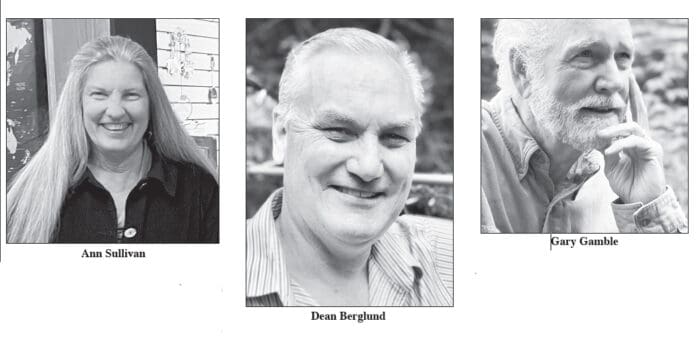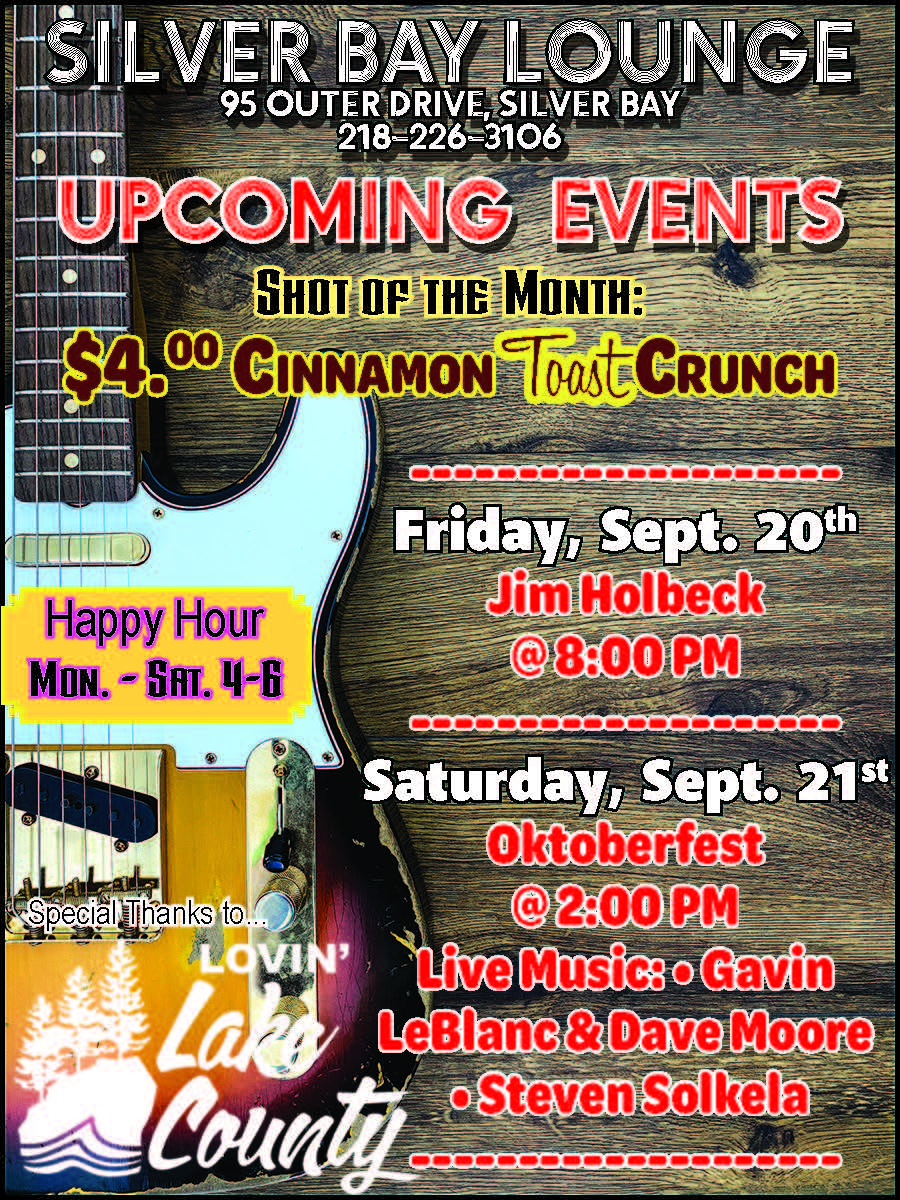County Commissioners in Minnesota are the most influential elected officials in your area. We have asked the candidates on the ballot for Districts 2 and 4 in Cook County a series of questions, and their answers follow. Due to space considerations, some of their remarks were edited. You may and should contact the candidate directly for further clarification on these or other issues.
There is one candidate on the ballot for District 2, Garry Gamble. He previously served a term as a commissioner from 2013 to 2016.
Two candidates are on the ballot for District 4. Ann Sullivan is the incumbent, having served two two-year terms. Her opponent for this four-year term is Dean Berglund. Four years ago, the two candidates stood for an election to the open District 4 seat, and Sullivan won 476 to 407.
Who are you?
Gamble 2: I married my high school sweetheart–whom I met while performing in the Bloomington High School musical “Brigadoon.” We have been blessed with five talented children who are all raising gifted children of their own. We lost our daughter Jessa to cancer in 2021 at the age of 42 years. As with all parents who lose a child, we celebrate her life and her deep faith. As Jessa wrote, “I’ll be running into glory, breathing peace for eternity.”
I possess a great sense of awareness, am an intent–present– listener to the stories of people’s lives, recognize the importance of giving the gift of time to others, value the importance of rightly-held tradition, and respect God-given individuality.
Sullivan 4: I was born in the Twin Cities to a pair of former naval officers following WWII. I’ve spent lots of time in Cook County, beginning in the late 1950s. My father and grandfather regularly brought the family up the North Shore, and I can remember driving up the Gunflint Trail to camp, hunt, and fish before it was paved. I moved here with my family following a 44-year career in education, serving as a middle and high school teacher, instructional trainer, and principal.
I was elected District 4 commissioner in 2020 and re-elected in 2022 when all commissioners ran due to redistricting.
Berglund 4: I am a lifelong resident of Cook County who has been a straightforward business owner for over forty years. I started driving a truck for Hedstrom Lumber during my senior year at Cook County High School, and I’ve kept the engine running ever since.
During these many years, I have earned a reputation for being hardworking and resourceful. Those who know me know me to be reliable; when I say I am going to do something, they know I will do it. I recognize the importance of honoring my commitments and building strong relationships.
I have been a single father for eleven years, raising three amazing sons who have benefited from our shared love of the outdoors and their close relationships with large-hearted grandparents. My faith and my family are important to me.
What do you think is the role of County Commissioners?
Sullivan 4: As a county commissioner, I serve on a team of decision-makers who represent the interests of their district while working to improve our county as a whole.
Responsibilities include developing and overseeing policies related to public services such as infrastructure, health, public safety, and economic development. We are also involved in managing budgets, allocating funding, and collaborating with other government agencies to ensure the efficient use of resources.
Commissioners act as liaisons between the public and the county, addressing community concerns, shaping long-term goals, and fostering growth and development.
Berglund 4: To be responsible. To do the work of the people by making wise decisions, keeping balance in decision-making, and keeping as much of the taxpayer’s money in their pockets as is possible, not the government’s pockets. Common sense.
Gamble 2: I have learned first-hand that being a county commissioner is neither ‘comfortable’ nor ‘convenient’; at least, it shouldn’t be if you are serving the people who entrusted you with the responsibility.
I believe in the merits of “relentless reductionism” in identifying and determining direction and know that “deciding what not to do is as important as deciding what to do.”
To make good decisions, a commissioner needs good information. Gathering the necessary data and statistics requires considerable time. During my previous term as County Commissioner, I averaged 40-plus hours a week conducting research, drafting documents, attending meetings, and responding to constituent inquiries. I did not miss a regularly scheduled Commissioner Board Meeting during the four years I served on behalf of County taxpayers.”
Tourism is the primary driver for the county’s economy. Too much? Too little? Or just right?
Berglund 4: This question sort of reminds me of the story of the three bears: Too hot, too cold, or just right? The Bear Story teaches us that no decision should be made without properly checking out the situation. I agree. We need to assess the situation properly before committing to a decision about what is “just the right amount.”
Gamble 2: Minnesota’s $22.8 billion tourism industry has become a year-round venture. Visitors generate over $220 million of economic activity annually at the local level.
While tourism continues to play a positive and significant role in society, it can also bring adverse socio-economic effects if managed poorly.
Tourism can result in the commodification of our local culture, the displacement of the local population, and changes in the lifestyle and values of local communities. Too many visitors flocking to the same place can decrease the quality of life for residents by increasing housing costs, spawning local price inflation, empty shelves, labor in-migration, limiting the diversity of economic opportunities, and exposing residents to the misuse of public spaces.
Research and empirical evidence show that rural areas, like Cook County, are characterized by widespread income inequality. This can lead to viewing local people as “obstacles to development.”
This exclusion can result in locals not seeing equal benefits from tourism and instead finding themselves a minority within their community, losing the right to everyday life in their local spaces.
Moving forward, we must define and find proper balance as “satisfied locals generate satisfied tourists.”
Sullivan 4: About 80% of the jobs in Cook County rely on the tourism industry. This tourism-based economy increases local revenue, boosts small businesses, promotes cultural exchange, and reduces the reliance on traditional industries.
However, it also presents challenges. We need to diversify our economy as best we can. Our seasonal fluctuations can lead to economic instability and leave us vulnerable to downturns related to events like a global pandemic or economic recessions.
Fortunately, Visit Cook County has worked hard to create events during the “shoulder seasons” to better stabilize our economy, along with the creative efforts of local entrepreneurs. As we know, tourism can strain local resources and drive up the cost of living for residents. But, the key isn’t more or less tourism; it is about balancing growth with sustainability.”
What is the biggest challenge facing Cook County Government, and what do you propose to do to meet it?
Gamble 2: Given local governments’ budget constraints, we must learn to move beyond the traditional and unsustainable tax and consumption model of county governance.
Cook County may be an attractive place to live but for a growing number of residents, not an affordable place to remain.
Cook County has the highest cost of government per person than any of the state’s other 86 counties.
There are those who appear unconcerned, as statistics often mask “on-the-ground realities.” . . . and, as we have witnessed, those in the public sector consentingly move to vote themselves wage increases at the expense of the private sector when the value of money relative to costs decreases.
We must learn to “put the individual citizen” at the center of our community, not just the tourist businesses and public sector, which is part of our economy employed by the government.
Counties that can respond to and adapt to changing economic conditions will be better equipped to bounce back from downturns, support community workforce development, facilitate sustainable growth, and–most importantly– retain their valued generational families.
Sullivan 4: One of the biggest challenges is balancing limited resources with our community’s growing needs. Maintenance, infrastructure, public
local businesses, and other stakeholders. We need to prioritize and implement long-term solutions for sustainability. I will use my ability to listen, my experience, continued research, and established networks to work together to manage our resources and meet the needs of our county.
Berglund 4: How to spend other people’s money. We need to find ways to conduct government business more efficiently, live within our means, and eliminate waste. Commissioners must be willing to make tough decisions. I believe the better informed I am, the better decisions I will make on behalf of those who place their trust in me.
Is there anything else you want voters to know?
Sullivan 4: I came here with my family on trips as a kid, and as an adult, I would head for the Boundary Waters whenever I could with my husband, son, and friends. My passion for our county isn’t measured by the length of time I’ve enjoyed this place or the number of years I’ve owned property here, but it is demonstrated by the volunteerism and service I provide to the people and this place, which I love. I could never have imagined then that one day, I would have the honor to serve this community as a commissioner. It is a job I take seriously that is both a significant and fulfilling responsibility. I approach it as a full-time job. As commissioner, I always have my eye on what is best for the community and what I can contribute now in these challenging times of growth and transition to ensure our county will prosper and thrive.
Berglund 4: My years in business have given me experience in making tough financial decisions that keep my checkbook in the black and help me better understand what is best for my business as I look toward the future. It’s about need, not want. These experiences and values will help to keep me both responsible and accountable when it comes to county spending. We cannot continue to fund excessive tax increases.
When comparing Cook County to other counties similar to ours, we have earned a reputation for being unwise when it comes to spending taxpayer dollars. I am all about smarter government, protecting personal freedoms, and the rule of law. I’ve crossed the Canadian border enough times in my business travels to appreciate the importance of sticking to the rules.
Right decisions require the right person, with the right focus, at the right time, for the right reasons, to safeguard the right outcomes. I humbly submit that I am the right person and would value your vote. Whatever I don’t know in my head right now, I will get there by way of my heart for the people of this community.
Gamble 2: Government officials must guard against making ill-considered, potentially imprudent decisions when investing in expanded construction or retrofits of public buildings.
One of the most important characteristics of a public servant is the willingness to listen actively and the ability to welcome and appreciate different points of view rather than just trying to prove your point or champion personal agendas couched in persuasive rhetoric. A public servant is expected to check facts, suspend judgment, and hear everyone out before making decisions.
When people openly and freely share ideas, the increased time investment is more than offset by the quality of the decision.
It has been said that democracy is a slow process of stumbling to the right decision instead of going straight forward to the wrong one.
Conclusion
The Northshore Journal acknowledges these candidates for their willingness to stand for election and commitment to the community and for allowing us to present some of their positions to our readers.
Election day is November 5, but registered Cook County voters who live outside the city limits of Grand Marais will automatically receive a mail ballot in October.
To reach out to one or more of the candidates profiled here, please email them:
garrygamble@me.com
voteannsullivan@gmail.com
berglunddean@gmail.com





